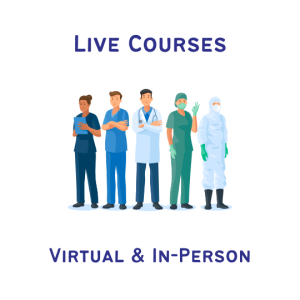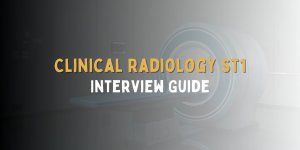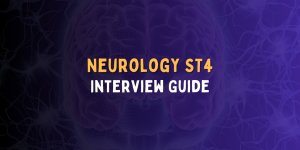
Published February 7, 2024 | Updated May 29, 2024
By Dr. Maliha Darmini
This is Dr. Maliha Darmini, an IMG in the UK. Trying to balance my medical expertise with the craft of storytelling.
The Ophthalmology ST1 interview stands as a pivotal milestone for aspiring ophthalmologists, marking the initial step towards a fulfilling career in eye care. This is the last active stage in the ophthalmology st1 application, and success here means you’ll be ranked for a potential training number.
This highly competitive process evaluates candidates on various fronts, ranging from clinical knowledge to communication skills and personal attributes. The process has changed for 2024, and we’re all in for a surprise as to the exact format. Despite this, we’ll do our best to give you tips and advice to get yourself into the best possible position!
In this article, we explore the intricacies of the Ophthalmology ST1 interview, providing insights and tips to help candidates navigate this pivotal stage with confidence and poise.
We’ll walk you through:


Sean and Binita are both Ophthalmology trainees at NHS HEE East of England, having started ST1 together in 2019. They both have an interest in medical education with Binita now taking up the role of regional simulation lead, as well as clinical lead of Women in Vision UK.
Sean has taken a lead on the digital learning front both on a regional level as a HEE Blended Learning Fellow, and on a national scale as the Professional Development Lead on the Digital Learning Subcommittee of the Royal College of Ophthalmologists.
They’ve combined their passion for medical education and helped many applicants since setting up their bespoke course EyePrep in 2019 with other fantastic colleagues in the region. If you want to gain an edge when it comes to your OST application and interview, book a course with EyePrep.
Key Documents
OST Recruitment Timeline
Check the schedule for crucial dates during the selection process on the recruitment timetable. The timetable is also accessible in the resources section on the National Ophthalmology website.
| Vacancies published | Wednesday 25th October 2023 by 5pm |
| Applications open | Thursday 26th October 2023 at 10am |
| Applications close | Thursday 23rd November 2023 at 4pm |
| Invitation to MSRA | By Thursday 14th December 2023 |
| MSRA Exam | Thursday 4th – Tuesday 16th January 2024 |
| Evidence Document Upload | Wednesday 7th – Tuesday 13th February 2024 |
| Evidence Folder Feedback | Wednesday 21st – Friday 23rd February 2024* |
| Invitation to interview | Wednesday 6th March 2024 |
| Interviews | Friday 15th March 2024 |
| Interview Feedback | 22nd March 2024 |
| Initial Offers out | By Tuesday 26th March 2024 |
| Post start date | Wednesday 7th August 2024 |
The Severn deanery site gives 2 dates for the evidence folder feedback – 21st Feb or 23rd Feb – depending on which page you look at. We have confirmed with Severn PGME that it will be sometime between these dates:
“Due to the timescale that we are running to the earliest will be the 21st and the latest will be the 23rd for the release of feedback.“
Severn PGME
The Interview Format
The assessment will be conducted virtually on 15th March 2024 – so you’ll be in front of your webcam rather than in a meeting room.
Candidates must book slots through Oriel, and availability is on a first-come, first-served basis. In other words, the earlier you book or request an interview slot, the higher the likelihood of securing your preferred time, as slots may fill up quickly.
The interview aims to evaluate both knowledge and communication skills through the two stations.
Be Prepared
Here are some things you must sort out before the interview:
Interview Stations
The interview will be conducted in two phases, which can be done in any order – be prepared to start on either section.
The total interview time is around 45 minutes, which will include:
The debrief will be your chance to talk to one of the consultant assessors and to ask questions or provide feedback.
Interview Station – Clinical Knowledge AssessmentDuration: Up to 10 mins
This component is an assessment of clinical knowledge that involves engaging in a patient consultation with an actor in a medical scenario. The actor will be taking the role of either a patient or a carer for a patient.
You’ll have two assessors who will score you – see below for the mark scheme. You won’t be able to see or hear the assessors – you will deal solely with the simulated patient/carer.
We go into more detail on the clinical station questions below.
Interview Station – Difficult Communication or Ethical Scenario AssessmentDuration: Up to 10 mins
This component assesses the candidate’s ability to handle challenging communication or ethical scenarios. Again, this will involve an actor playing patient or carer. The simulated patient will be communicating with you and it’s your job to communicate the best you can through a difficult communication or ethical scenario.
You’ll have two assessors watching your performance, but you won’t be able to see or hear them.
Take a look at the interview questions section for more details on the type of scenarios you can expect.
Interview Scoring
Candidates will be scored and assessed by two assessors who will only observe their interactions during the interview sessions. They will evaluate each candidate based on predetermined criteria.
What is the scoring criteria, you ask? We have no idea.
We’ve searched far and wide across the internet, and there doesn’t appear to be a hint at how marking works for the ophthalmology interview, which is a shame as this makes the “40%” mark quite confusing to obtain.
All we can say here is to do your best and cross your fingers! 🤞
Feedback will be provided in stages throughout the selection process, with distinct release dates for feedback on the evidence folder and feedback from the online assessment.
If you manage to score 40% or more at this stage, you will move to the final stage of application, whereby you will be given a mark out of 100 based on:
- Evidence folder – Max 50 points
- Online assessment – Max 30 points
- MSRA – Max 20 points
So, your interview score will count for 30% of your final mark.
Remaining candidates will be ranked based on this final score, with offers being given based on this ranking (e.g. if 100 places are available, the top 100 will initially recieve offers, with #101 being offered a place if someone in the top 100 declines, and so on).
Sean & Binita’s Tips – The Interview
Interviews are difficult, especially when the stakes are high.
With any OSCE or interviews where it relies on the delivery of information and communication, it is important to practice in a mock environment to time. We highly recommend partnering up with others or asking a friendly colleague/senior to carry out mock interviews. This will help give you structure to your answers and communication scenarios.
Remember, they do not expect you to be a senior registrar at the time of the interview, but a good doctor with an interest in Ophthalmology.
The clinical station makes a return this year. It is likely a different format from the previous four to five clinical scenario OSCE stations that ran before COVID. Instead, it will probably be a single case and patient interaction. Therefore, you can target your reading to topics that involve diseases with serious sight-threatening implications or systemic involvement.
For those who are struggling to find a partner or want to simply verbalise their practice, check out www.iprepbuddy.com
What to Wear During The Interview
Now, forgive us for telling you what to wear.
Although there is no certain reference to the dress code for this interview, you will no doubt be seen negatively if you look unprofessional. This is absolutely your call, and to say that you should be aiming for “corporate beige” with no added personality is an old-fashioned view. That being said, some of your assessors may have old-fashioned views and could mark you down for your appearance due to unconscious bias.
The two stations are essentially telemedicine consultations and should be treated as such. Think about how you would like to present yourself to your patients, and maybe add an extra layer of professional sheen, just for good luck.
You could opt for professional attire with a formal shirt or blouse, and consider adding a blazer for a polished look. You could also choose neutral or solid colours, minimise accessories, and ensure a well-groomed appearance.
Alternatively, you could go for a onesie. (maybe don’t do this)
It is expected to make some effort for your attire, but you should still be comfortable with whatever you choose.

Interview Questions and Answers
This is where we get out our get-out-of-jail-free card again and tell you that we don’t know exactly what will be asked during the interview, especially for the clinical station.
However, there are some general topics you should be aware of, as well as a general approach to this.
Clinical Knowledge Assessment
In past years, scoring has been in favour of the clinical knowledge station. That being said, things have changed this year and we don’t have an idea of what the mark scheme will be.
In general, the questions will be related to common conditions that would often come up in an eye clinic, or emergencies that are must-know. This could include conditions such as:
Remember, however, that in the 2024 interview you will not see or hear the assessors. This means that if you’re asked any questions, it will be from the simulated patient/relative themselves. We don’t know exactly the format this will take, but it could include things like:
The interview will assess both communication and clinical knowledge. It’s important to practise your history taking and communication skills, as well as knowing how to approach presenting complaints including:
What your interviewers want is someone who is safe, knowledgeable, and competent. They want to see whether they would trust you to be their registrar, carrying out their instructions and looking after their patients.
Beyond this, there’s not much more information we can give at this stage as this is a new approach to the interview station!
While Preparing for This Station:
- Prioritise concise responses over lengthy explanations.
- Focus on your basic knowledge rather than delving into the details of clinical trials.
- Address associated systemic risk factors.
- Be prepared for scenarios that link ophthalmic conditions with systemic associations, such as Uveitis with Ankylosing Spondylitis or Inflammatory Bowel Disease.
Simplify Your Task
Don’t burden yourself with memorising complex definitions of conditions like “Neurofibromatosis” or “Ectopic Lens”. Go with the common conditions that you may encounter at your daily practice, Glaucoma, Cataract, Maculopathies, Retinopathies, etc.
Ensure you can explain a medical condition in simple English, without going into its mechanism of action. For Example, if you are explaining Glaucoma, you can simply say:
“Glaucoma is the rise of pressure inside the eye caused by the building up of fluid”
Prepare in a way that proves you a safe doctor for your patients who won’t miss any fundamental as well as simple cues. You should be able to recognise critical signs like a third nerve palsy, a swollen optic disc, or an RAPD (Relative Afferent Pupillary Defect), though in an online assessment you won’t necessarily have a chance to demonstrate your examination skills.
Sean & Binita – Clinical Station for 2024
Regarding the clinical station, the format has changed this year. It’s unlikely that anyone (apart from the RCOphth committee) knows what the format of the questions will be.
While we can guess, it is still a patient interaction, so not a direct clinical question per se. In our course, we are preparing people for the most likely scenarios and getting them to think on their feet. The most important thing is to essentially be a good doctor and practice the safest things first.
Medical Consultation – Communication & Ethics
Scenarios will be given to assess how a candidate is communicating with the patient. You will be dealing with a simulated patient or relative rather than an assessor.
There are various scenarios that you could come across here – the important thing is to be able to show that you’re proficient and empathetic communicator who can confidently deal with difficult communication or ethical situations.
These scenarios could include:
To crack these stations, adopting skills like Building Rapport, Active listening, and demonstrating empathy are paramount.
Building Rapport establishes a positive connection with the patient. It fosters trust and comfort in the communication process.
Listening actively ensures a thorough understanding of the patient’s concerns, allowing for accurate and empathetic responses.
Empathy, in particular, is crucial for demonstrating understanding and support. This makes patients feel heard and valued.
Communication Tips
Online Materials & Resources
There is plenty out there that can help you to prepare for your ophthalmology interview. You just need to know where to look.
Something new is happening over at iPrepBuddy – an AI tool that you can interact with to practise your communication and interview skills, with personalised feedback. It’s only £5, and there are a good number of scenarios tailored to ophthalmology exam topics.
Question Banks
There are several free and paid question banks available for your OST interview. You may find these helpful to use with a study buddy.
Interview Courses
There are plenty of courses available for the ophthalmology interview, including on-demand resources from Peerr and MedSet, and live courses from providers like EyePrep, Ticket to Ophthalmology, and ST1 Ophthalmology.
Online courses might help you to get up to speed on your clinical knowledge, whereas live courses will likely include a mock to help you get personalised feedback.
Books
While numerous interview skills books exist, a highly recommended one is “A Comprehensive Guide to CT, ST & Registrar Interview Skills” by ISC Medical.
The book covers a range of medical interview questions, tactics, and techniques. It guides readers to prepare scenarios from their experience as doctors, ensuring readiness for a variety of questions.
Social Media
Stay connected with social media groups where a community of candidates share their experiences.
You can even get the latest updates regarding exam patterns, schedules, and study materials for current and previous exams.
Conclusion
Securing a spot in Ophthalmology ST1 is a challenging yet doable process that requires dedication and strategic planning. Understanding the application process and preparing well are your secret weapons.
As you step into the interview room, let your passion for Ophthalmology shine.
I hope your hard work pays off, and you do great in this exciting opportunity. Best of luck!
Sean & Binita – Final Tips
Start thinking about interview preparation earlier. It can be very stressful thinking about the MSRA and portfolio that you can easily neglect the interview until you’ve been allocated an interview slot.
Start reading around topics early (remember ophthalmic emergencies and conditions with systemic involvement), and please practice. Very few people are born excellent communicators, and preparing aloud is key to ensuring you deliver your best performance on the day.












